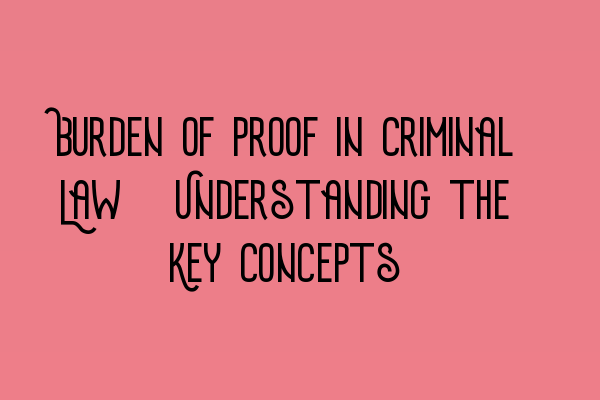Burden of Proof in Criminal Law: Understanding the Key Concepts
Welcome to SQE Criminal Law & Practice, your go-to resource for all things related to criminal law in the UK.
Today, we are delving into the crucial topic of the burden of proof in criminal law and providing a comprehensive
understanding of its key concepts. The burden of proof is often the backbone of any criminal trial, and it is
essential for both solicitors and aspiring solicitors to grasp its significance.
The Significance of the Burden of Proof
Before we dive into the key concepts, let’s first understand why the burden of proof is so important. In criminal
law, the burden of proof lies with the prosecution, which means that it is their responsibility to prove the guilt of
the accused beyond a reasonable doubt. This principle is deeply rooted in the idea that it is better to let multiple
guilty individuals go free than to convict an innocent person.
This principle ensures that the accused is presumed innocent until proven guilty. It safeguards the rights of the
accused and upholds the integrity of the criminal justice system. As a solicitor, it is crucial to understand the
burden of proof to effectively represent your client and navigate the complexities of criminal law.
Key Concepts of the Burden of Proof
Now, let’s delve into the key concepts surrounding the burden of proof:
- Proof beyond a reasonable doubt: The burden of proof in criminal law is to establish the guilt of
the accused beyond a reasonable doubt. This standard of proof is the highest standard in the legal system and
requires the prosecution to present evidence that convinces the jury or judge of the accused’s guilt to an almost
absolute certainty. Therefore, any reasonable doubt that arises in the trier of fact’s mind may result in an
acquittal. - Innocent until proven guilty: The burden of proof rests with the prosecution, and the accused is
presumed innocent until proven guilty. This principle emphasizes the importance of evidence and the obligation of
the prosecution to provide convincing evidence to establish guilt. As a solicitor, it is crucial to challenge the
prosecution’s evidence and create doubt in the minds of the trier of fact to protect the rights of your
client. - The shifting burden: In some cases, the burden of proof may shift from the prosecution to the
defense. This usually happens in situations where the defense raises an affirmative defense, such as self-defense
or insanity. In such cases, the defense must present some evidence to support their claim and shift the burden of
proof. However, it’s important to note that the overall burden never shifts entirely to the defense, and the burden
of proof beyond a reasonable doubt still lies with the prosecution. - Standard of proof in civil cases: In contrast to criminal cases, civil cases have a lower burden
of proof. The standard of proof in civil cases is known as the balance of probabilities, where the party with the
stronger evidence is favored. It is important to understand this distinction as a solicitor and adapt your approach
accordingly when handling both criminal and civil cases.
Conclusion
In conclusion, understanding the burden of proof in criminal law is essential for solicitors and aspiring solicitors
alike. It is a fundamental concept that shapes the dynamics of criminal trials and ensures the protection of
individual rights. By grasping the key concepts, such as proof beyond a reasonable doubt and the presumption of
innocence, solicitors can effectively advocate for their clients and contribute to a fair and just criminal justice
system.
For more insights into criminal law, check out our other articles:
- SQE
Exam Prep: Essential Study Materials for Aspiring Solicitors - Expert
Testimonies in UK Courts: Building Strong Cases - Demystifying
the Solicitors Qualifying Examination Format - SQE
Exam for International Lawyers: Challenges and Success Strategies - LLC
Formation Made Simple: Step-by-Step Guide for UK Entrepreneurs
Stay tuned for more informative articles on criminal law and practice from SQE Criminal Law & Practice. If you have
any questions or require legal assistance, feel free to reach out to us. We are here to help you navigate the
complexities of criminal law.
